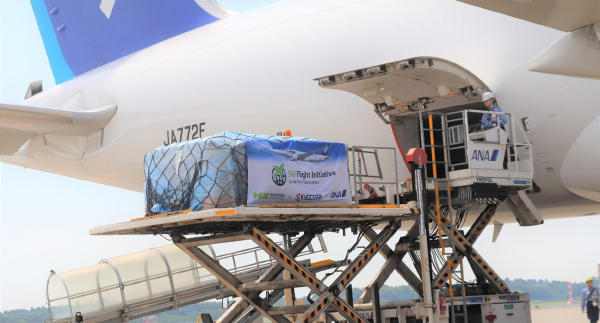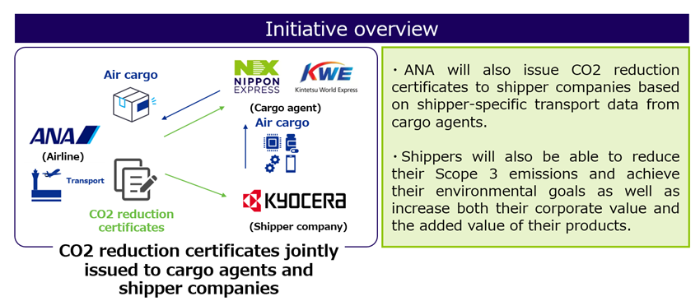--SAF Flight Initiative cargo program supports shippers in reducing Scope 3 emissions--
Nippon Express Co., Ltd. (President: Shinjiro Takezoe; hereinafter "Nippon Express"), a group company of NIPPON EXPRESS HOLDINGS, INC. (President: Satoshi Horikiri), has concluded a three-way agreement with Kyocera Corporation (President: Hideo Tanimoto; hereinafter "Kyocera") and All Nippon Airways Co., Ltd. (President: Shinichi Inoue; hereinafter "ANA") on the "SAF Flight Initiative: For the Next Generation" cargo program offered by ANA.

The SAF Flight Initiative launched by ANA in October 2021 is the first program in Asia designed to visualize and reduce indirect CO2 emissions(*1) generated by air cargo transport through the use of sustainable aviation fuel (SAF) and other means. Nippon Express has participated in the program since its inception as part of its efforts to address climate change. A new service for shipper companies was launched in September 2023, and Kyocera became the first shipper company to participate. Nippon Express is involved in Kyocera's logistics services, and its cooperation as a freight agent (forwarder) contributed to the development of this initiative.

To address climate change, the NX Group aims to reduce its own group-wide CO2 emissions (Scope 1, 2) by 50% from 2013 levels no later than 2030, and it submitted a letter of commitment in May 2023 to obtain certification under the Science Based Targets initiative (SBTi). Its longer-term goal is to help bring about carbon-neutral societies by 2050 (Scope 1, 2, 3).
This initiative is compatible with one of the NX Group's five materialities: "develop and strengthen sustainable solutions". To achieve its Sustainability Vision, the NX Group will continue sharing its views on environmental conservation with its stakeholders and pursuing initiatives that address the five materialities.
(*1) The GHG Protocol, an international standard jointly developed by the World Resources Institute (WRI) and the World Business Council for Sustainable Development (WBCSD), classifies a company's CO2 emissions into three categories:
Scope 1: Direct CO2 emissions from the company's business activities
Scope 2: The company's CO2 emissions from electricity consumption and other heat/power sources, etc., supplied by other companies
Scope 3: Indirect CO2 emissions from the company's business activities (transport of products, employee commuting, business trips, etc.)